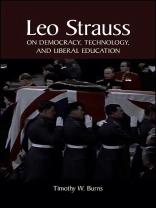The first book-length study of Leo Strauss’ understanding of the relation between modern democracy, technology, and liberal education.
Liberal democracy is today under unprecedented attack from both the left and the right. Offering a fresh and penetrating examination of how Leo Strauss understood the emergence of liberal democracy and what is necessary to sustain and elevate it, Leo Strauss on Democracy, Technology, and Liberal Education explores Strauss’ view of the intimate (and troubling) relation between the philosophic promotion of liberal democracy and the turn to the modern scientific-technological project of the ‘conquest of nature.’ Timothy W. Burns explicates the political reasoning behind Strauss’ recommendation of reminders of genuine political greatness within democracy over and against the failure of nihilistic youth to recognize it. Elucidating what Strauss envisaged by a liberally-educated sub-political or cultural-level aristocracy-one that could elevate and sustain liberal democracy-and the roles that both philosophy and divine-law traditions should have in that education, Burns also lays out Strauss’ frequent (though often tacit) engagement with the thought of Heidegger on these issues.
สารบัญ
Acknowledgments
Introduction
1. Democracy and Liberal Education
2. An Aristocracy within a Democracy: ‘Liberal Education and Responsibility’
3. ‘German Nihilism’
4. ‘The Liberalism of Classical Political Philosophy’
5. Concluding Reflections on Moral-Political Reasoning in Contemporary Liberal Democracy
Index
เกี่ยวกับผู้แต่ง
Timothy W. Burns is is Professor and Graduate Program Director of Political Science at Baylor University. His books include Philosophy, History, and Tyranny: Reexamining the Debate between Leo Strauss and Alexandre Kojève (coedited with Bryan-Paul Frost), also published by SUNY Press.












